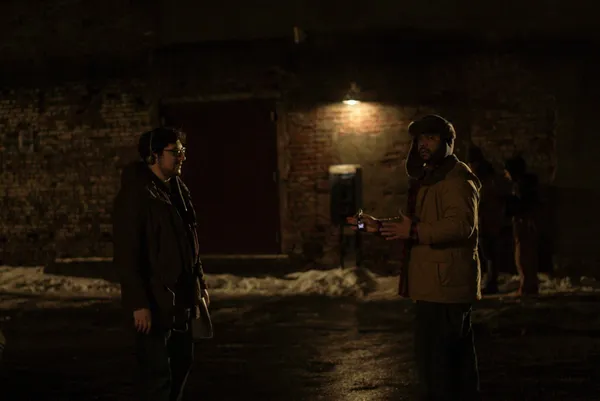 |
| Behind the scenes on Stationed At Home, in Binghamton, New York |
In a snowy town on Christmas Eve, a cab driver sets out on his rounds. It’s 1998, and the International Space Station has just been launched. He has promised his cat that he will back in time for them to watch it pass overhead, but in the course of the night, the people he meets will change everything. This is Stationed At Home, the début feature from director Daniel V Masciari, and it’s screening as part of the Glasgow Film Festival. I met Daniel and his producer (and former teacher) Eliza VanCort, who also has a role in it, to learn how this charmer of a film came to life.
“I was on a bus,” Daniel begins. “I was living in Brooklyn at the time, and I was visiting upstate in Ithaca, and I stopped in Binghamton, and it was cold and it was really dark, and there was this abandoned train station. I never really knew much about Binghamton, New York, and I was listening to this song, Dusk by Duke Ellington. There was just something about this forgotten city, combined with that jazz music, that conjured the idea of the film and the mood of the film. And a lot of the buildings in Binghamton have this real Gothic sort of architecture style. It all came about from that feeling.”
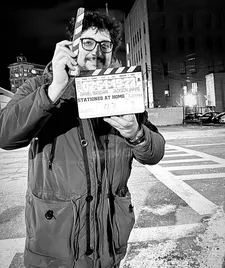 |
| Daniel V Masciari gets ready for action |
The snow in the film gives it a magical quality. Was it snowy then?
“There was some snow, but it was mostly just the cold. It felt very much as if there was an opening for a story. One of my actors, Erik Bjarnar, who played Ralph, he has a real love of space, and that just made me think of him driving a cab. And then I started writing and. And, yeah, so then other characters started to come about.”
“Daniel is quite the mad genius in some ways,” says Eliza. “He was coming to visit me and a bunch of friends, because we all have this artistic circle here in Ithaca. And he walked in and basically was like, ‘I got this idea while I was driving through Binghamton. Oh, my God. This film just dropped in my head.’ And he sort of disappeared for a while, and then this magical thing started to come out of his brain. It was really quite amazing. Daniel, I hope it's okay I say this, but I feel like you see the world through the eyes of a film. You know, you're always seeing a film, and it was just magical seeing it all come together.”
I ask Daniel if he developed the characters and then went looking for people who could play them, or if he always had some of the people in his group in mind. “I'm very fortunate to have Eliza as someone who taught me the Meisner technique for acting,” he says. “I met a lot of really incredible actors there. Of the actors I knew of or had met, I'd say about 75% are people who have inspired me in some ways, as muses. So it wasn't so much that the characters were necessarily preconceived. I just saw them in this world in some way, sort of like as parallel characters that they might be in another world had they not been actors. There's just something about the city of Binghamton as a place that can hold these different kinds of personalities. I think the fact that the city is forgotten allows for characters who are maybe a bit disconnected from the rest of the world. That was always interesting to me, to see how strangers can come together and have a very unexpected experience.”
Eliza explains the Meisner technique for readers who might be unfamiliar with it.
“Sanford Meisner was one of the big preeminent acting teachers in the United States. And unlike method acting, where you sort of pull it out of yourself, the Meisner technique is based on the idea that you are instead living truthfully under imaginary circumstances, moment by moment, by focusing on the person in front of you. And so it's really about what humanity is about, which is human connection and interaction, which is really why I think Meisner actors can be so powerfully present and spontaneous because they're not anticipating what the line will be, but instead they are living within the character, but they're always taking in data from the other person.”
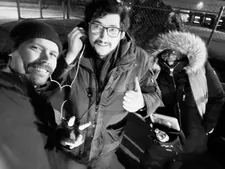 |
| Behind the scenes on Stationed At Home |
“I've worked with many of these actors in different capacities, so we have a shorthand of how we can communicate,” Daniel says. “So you don't necessarily have to do five to eight takes. We could do some in three takes. And so Jackson Jarvis, who's been part of this since conception, he and I planned every shot very, very carefully. That allowed for the actors to play and also have a strong base, so they know that they have a good reference point for the whole scene.
“The preparation and the clarity of what we were doing allowed for a calmness because we shot the film in 15 days. With that comes a necessity to be super prepared, so that communication between us and the actors was really important, to get it done in that time period. And the fact that we worked together and we all studied Meissner technique really allowed for a very deep understanding of what we were going for and being. We had time to rehearse a bit as well, so that was very helpful, and I also am very much an editor, so I knew what I wanted.”
“To me, what was so astounding is Daniel had a level of specificity with each shot,” says Eliza. “He knew exactly what he wanted. He'd already talked with us about it. We'd already done so much character development prior, so he was incredibly prepared and everything. The only way we could do it on a shoestring budget was that Daniel had the whole thing in his head before we shot it. And his level of direction, he is absolutely an actor's director. When you have a really good director, you don't need quite as many takes. At least, as an actor, that's what I experienced. I knew exactly what was needed of me, and I felt like I was in good hands.”
We discuss the sound design, which really adds a lot to the film, right from the start.
“The script includes a lot of sounds. I think very much this is going back to what we were talking about: Binghamton as this location, as a character. The sound was also super important. You can hear a very distant motorcycle or a very distant dog, just giving it that atmosphere. And me and my sound designer, Jack Liden, just had such a great time discovering all of these different sounds. Sound is half of a film. So the sound, I wanted it to reflect the loneliness of the location and also reflect a lot of the characters’ emotions.
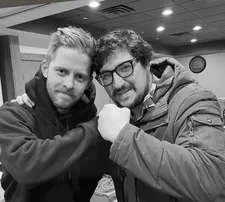 |
| "It sounds cheesy, but my team is excellent" - Daniel V Masciari |
“We had this wonderful discovery well into our sound design process, which was that I had this idea of Ralph the cab driver being sort of an owl, like a night owl. And I was working with Jack and one night I said ‘We need an owl at the beginning of the film and then three other places.’ It was really exciting because it's such a subtle sound, but it has something. There aren't many sounds in the winter, really, in that rural area. So having an owl really just sets the tone of who Ralph is.”
Daniel spoke of Binghamton as an abandoned city. Did that make it easier when it came to locations?
“It did, actually. The city was super welcoming in basically any way we wanted to shoot. And also there aren't too many people in many parts of Binghamton. So if we needed an alleyway, for example, it was super easy to get the permits to shoot there. Essentially everything was super straightforward. We didn't have to move many cars. And also in the winter, there just aren't many modern cars. You'd be surprised just how period 1998 is now. It actually is period now. And the differences are quite stunning with cars especially.”
We talk about the cat who plays a key role in the film and seems to be a natural talent.
“We were so fortunate that the cat took direction really well. The crew was laughing because I started saying ‘Move your head.’ And I was like, ‘Wait a second, this is an animal. It won't actually listen.’ But surprisingly, the cat did exactly what we needed. The cat was very easy to work with. And, yeah, the cat to me was – I mean, I don't want to project too much onto it, I would love the audience to have their own feeling about it – but I always felt like the cat was looking out for Ralph to a certain degree. And there's something about the cat being somewhat associated with the other realm, I guess, in the film. But, yeah, I don't want to tell people what to think about that. It just felt correct to me.”
In most films, I suggest, we’d be looking to the stars rather than to the International Space Station. Much of the time, people seek inspiration in the natural world. But with the conversations about the moon landing in the film, it seems to be saying something that experiencing wonder at what humans have achieved and is something worth being excited about in itself.
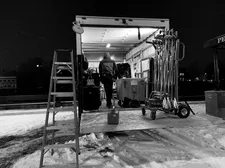 |
| Getting the gear in place |
“Definitely,” says Daniel. “Much of the film is about honing in on certain aspects of life that we might not be aware of, necessarily. And the space station, to me, is the epitome of that. I mean, there are quite literally humans up there flying around, and it's just a dot in the sky. It's one of the smallest things we can see yet it's probably one of the greatest accomplishments that you can see, almost any night if the clouds aren't there. And so to me, that was a real beautiful, tender force in the film. Having this idea of it and then actually seeing it go by, to me, was a really cinematic thing. And I really love that that seems to be coming through to people.”
I tell him that I think it does come together in quite a poetic way, which is not an easy thing to pull off. How confident was he that that would happen?
“You know, it sounds cheesy, but my team is excellent,” he says. “Between all the producers and Jackson, our DP, who did so much more than that as well, and the actors, I was never concerned about us pulling it off. I was more concerned about the weather not being on our side because, you know, when you don't have too much time to shoot, one night where you can't shoot could be the difference between getting everything you need and having to stitch something together. So I was never really concerned about us pulling it off because the script was very tight. The initial script was 138 pages and as Jax and I were translating it to the film itself, it came down to a perfect 100. So, yeah, I was never concerned about us accomplishing it, assuming the weather was on our side.”
Eliza felt the same way, she says.
“I was Daniel's teacher and we did a thing in our school that we would graduate people after they finished, we'd go up in front of everyone and talk about each student who was graduating. And I said, you know, ‘Daniel is going to make a brilliant film.’ I know there are people who have something in them that they can't live without getting it out there. They will relentlessly work on it to make sure their vision comes into the world, which is really the only way you do it, unless you have massive connections and tons of money, neither of which this film had when we started.
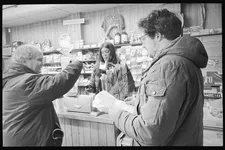 |
| Preparing to shoot an indoor scene |
“Daniel had a vision and I knew he would do it. I had no doubt, not for a second, even in times where we thought, ‘Are we going to get funding? What's going to happen?’ And, you know, it was scary, but I knew. We talked about it and I said to Daniel ‘I know it will happen because you will make it happen. There's no way it won't happen.’ So, yeah, no, I never had any doubt whatsoever. Daniel is an incredibly committed artist. When he sees something, he does it.”
I ask how it found its way to the Glasgow Film Festival.
“I'd heard of it many times and there was a film that I know of, Love Lies Bleeding, premièred there, so that really sort of honed me in on it,” Daniel says. “People just recommended that I submit there, knowing that it could be a festival that really gravitates to our film. And yeah, it's just such a great festival and it's just a huge honour for us to be able to world première at Glasgow. It's an incredible honour,” he says.
Eliza nods. “I would add that I think that one of the things that we are really learning more and more about Glasgow is that they have a real commitment to independent film and to highlighting new emerging artists who are doing exceptional work. And I feel like Stationed At Home is the perfect film for it because the quality of the film is really excellent and we just needed somebody who was ready to take on someone who no one had ever heard of before as a feature filmmaker. So we're thrilled. It's the perfect fit of a really forward thinking festival, with an exceptional new emerging director, so for me, I couldn't be more happy.”
“One of my favorite filmmakers of all time actually is Scottish: Lynne Ramsay,” says Daniel. “I know that some of her films have shown there as well. Scotland has always been someplace that I never thought I would go to, but I'm really excited to explore it and see all the films that are shown.”





















